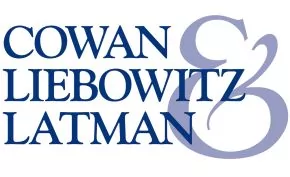- with readers working within the Media & Information industries
- within Cannabis & Hemp topic(s)

The U.S. Court of Appeals for the Second Circuit upheld a decision by the U.S. District Court for the Eastern District of New York that a sneaker, which featured for parodic purposes distorted versions of the trademarks, trade dress and design elements of a skateboarding sneaker and its packaging, was infringing and therefore was not excused by the First Amendment freedom of expression considerations applicable to works of art.
The Court followed the reasoning of the U.S. Supreme Court's decision in Jack Daniel's Properties, Inc. v. VIP Products LLC, 599 U.S. 140 (2023), which held that use of trademarks parodying the Jack Daniel's whiskey bottle and label was not protected speech, when used to indicate the source of the "Bad Spaniels" dog toy. Here you will find our previous article about that case. We also wrote another article about parody in general.
Vans Case Background
Vans specializes in skateboard-friendly footwear. One of its most recognizable products is its Old Skool® shoe. Vans often collaborates with artists and celebrities for special edition shoes, including the Old Skool shoe.
MSCHF is an art collective that recontextualizes everyday objects, as a commentary on contemporary society. Works by MSCHF have been displayed in museums, galleries, auction houses and art shows.
MSCHF has focused its artistic attention on the culture of "sneakerheads," the people who purchase shoes as collectibles to display but rarely to wear. To that end, it made and promoted the Wavy Baby shoe. The Wavy Baby shoe design was a digital distortion of the Vans Old Skool shoe, transforming the original design into an unbalanced shoe with wavy white side stripes on the upper and a wavy sole design unsuitable for skateboarding. MSCHF collaborated with the rap artist Tyga on the shoe release. To promote the shoe, Tyga posted in social media a video, pretending to microwave an Old Skool shoe to "produce" a Wavy Baby shoe.
MSCHF also mimicked the style and location of the graphics, trademark, colors, sole pattern, and shoebox of the Old Skool original.
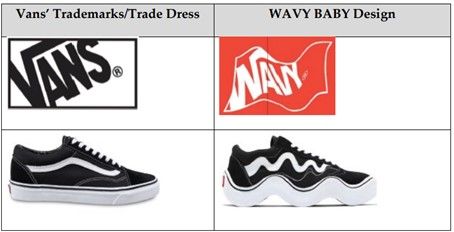
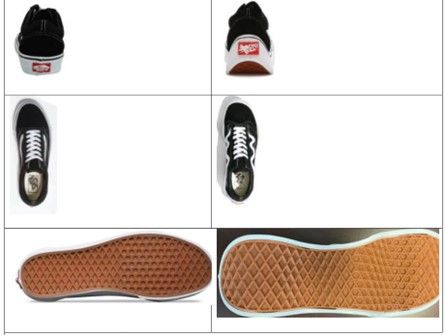
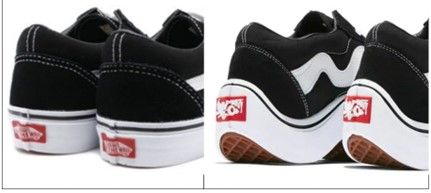
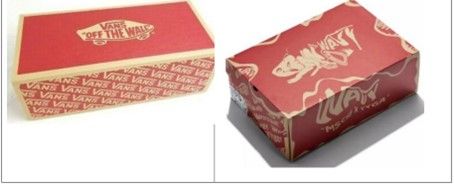
Vans sent a cease-and-desist letter to MSCHF. This lawsuit followed, in which Vans moved for a temporary restraining order and preliminary injunction to stop all marketing and sale of Wavy Baby shoes during the pendency of the case.
The District Court granted Vans' motion soon after oral argument. By then, MSCHF had sold 4,306 pairs of Wavy Baby shoes for $220 a pair, in a one-hour product release only through the MSCHF app.
MSCHF appealed to the Second Circuit, which affirmed the District Court's decision shortly after the U.S. Supreme Court's affirmance of the Ninth Circuit's decision in the Jack Daniel's case.
The District Court's Decision
MSCHF argued that its Wavy Baby shoe was not intended to be worn, but instead is a collectible work of art. The District Court's decision rejected this argument, because MSCHF had produced over 4,000 pairs of its shoes in a limited edition release, but had held back 280 pairs in reserve, in case the shoes were exchanged for another size. This fact suggested that the shoes were to be worn.
Moreover, while acknowledging that parodists have considerable leeway to make expressive works aimed at a trademark or product, the District Court followed the Ninth Circuit's holding in the Jack Daniel's case that a manufacturer may not use an alleged parody as a source identifier to sell a product.
The District Court pointed out that a successful parody referencing the original item must clearly indicate that it is not the original nor is it connected in any way with the brand owner of the targeted trademark. MSCHF did not take any such steps, and there was evidence of actual confusion.
In granting relief, the District Court held, among other things, that Vans was likely to suffer irreparable harm and to succeed on the merits of its claim because: (1) its marks had acquired secondary meaning as a source identifier, based on sales of over 200 million pairs of its Old Skool shoes and an investment of millions of dollars in advertising of its trade dress over nearly a half-century, (2) the MSCHF Wavy Baby shoe was of lesser quality, and (3) there was a likelihood of confusion as to the origin, affiliation or association, or endorsement of the MSCHF shoe.
Second Circuit's Decision
The Court of Appeals followed the U.S. Supreme Court's reasoning in Jack Daniel's, holding that special First Amendment protections do not apply if the alleged infringer is trading on the goodwill of the trademark owner by using its trademarks and trade dress in a source-identifying manner to market the infringer's own goods.
MSCHF contended the injunction was an unconstitutional prior restraint on its First Amendment rights, but the Court rejected this argument on the ground that trademark infringement implicates property rights, not speech rights.
The Court also upheld the District Court's findings that there was evidence to support both initial interest and post-sale confusion.
Although the Court of Appeals was skeptical that the inferior quality of the Wavy Baby shoe was likely to be important to consumers, this one factor did not change its conclusion that Vans was likely to prevail on the merits.
Accordingly, the Court affirmed the District Court's grant of a temporary restraining order and preliminary injunction.
Vans, Inc. v. MSCHF Product Studio, Inc., Docket No. 22-1006 (2d Cir. December. 5, 2023).
The content of this article is intended to provide a general guide to the subject matter. Specialist advice should be sought about your specific circumstances.

